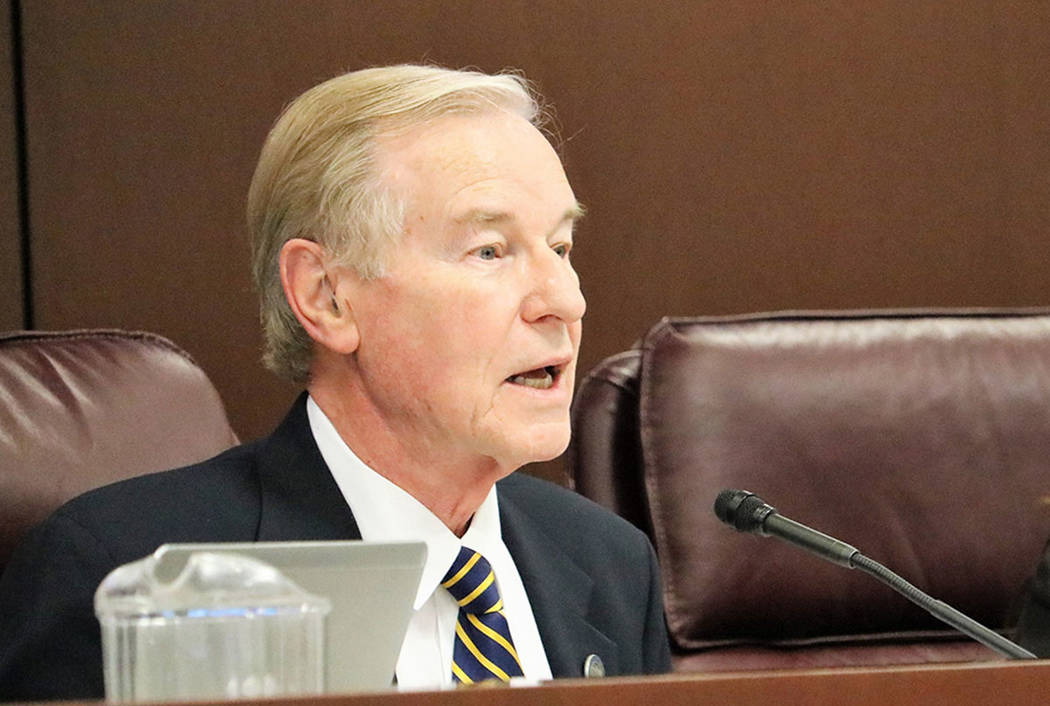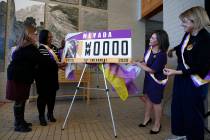New bill seeks teeth for Nevada public records laws
CARSON CITY — Backed by a bipartisan and diverse coalition of government transparency advocates and news organizations, a newly introduced bill is looking to add some bite to Nevada’s toothless public records laws.
Senate Bill 287, introduced on the Senate floor Friday, would bring three major overhauls to Nevada laws governing public records: limiting fees that governmental agencies can charge for records and requiring digital records whenever possible rather than costly paper duplicates; adding penalties and fines of up to $250,000 for agencies that improperly withhold records; and requiring agencies to work with records requesters to help them find what they are looking for rather than denying them on a technicality.
“Modernization and efficiency are the two operative words in describing this bill to update Nevada’s public records law,” said Tod Story, executive director of the ACLU of Nevada.
The bill was referred to the Senate Governmental Affairs Committee for hearings. Lead sponsor Sen. David Parks, D-Las Vegas, who chairs the committee, said the bill represents “a concerted effort by a broad group of individuals who have diverse interests.”
Coalition seeking transparency
That group includes civil rights and good government advocates, media organizations and current and former elected officials who have coalesced to form the group Right to Know Nevada to support improved access to public records. The coalition includes the Las Vegas Review-Journal, the ACLU of Nevada, the Nevada Press Association, the Nevada Policy Research Institute and more.
In a statement from the group Friday coinciding with the observance of Sunshine Week, Maggie McLetchie, a Las Vegas attorney who litigates public records cases, said the measure would likely reduce litigation over the accessing and obtaining of records.
“The goal is to eliminate the need for costly lawsuits and to simply have the government be fully transparent and accountable to the people it serves, which is what state law already requires,” McLetchie said.
In other states, such as Missouri and North Carolina, public officials can be held personally liable for violating public records laws. In Nebraska, those officials could face impeachment. And in West Virginia, Colorado and Arkansas, they could even face jail time.
Hurdles to getting records
Nevada’s public records law states that all government records, unless specifically deemed confidential under state law, are considered public and available for review by citizens. Confidential records include police officers’ home addresses and child welfare documents.
But governments in Nevada have no shortage of ways to avert the public’s view, from citing unrelated legal clauses to denying requests to charging fees that climb into the thousands of dollars and imposing waits of months or longer without a response.
Last year, it took a court order for the Las Vegas Metropolitan Police Department to release the body camera footage and 911 calls from the night of the Oct. 1, 2017 shooting at the Route 91 Harvest festival that left 58 people plus the shooter dead.
The city of Henderson initially rejected a Review-Journal records request for the investigative report that led to former Police Chief Patrick Moers being ousted from his job. The city claimed that it was confidential because it was a personnel record and that making the report public would discourage employees from coming forward with complaints.
And despite a court order deeming autopsy reports public, the Clark County coroner’s office is still refusing to release those documents, citing a decades-old Nevada attorney general’s office opinion.
The coalition is hoping to cut back or even eliminate those issues by means of the new bill.
“Government agencies willfully ignore the plain language of the Nevada Public Records Act because they face no consequence for doing so,” Review-Journal Executive Editor Glenn Cook said Friday. “No matter how many times the media and others successfully sue for the release of public records, the culture of secrecy worsens across the state. Roughly two dozen states punish those who illegally refuse to release public records, and those states have far more transparent, accountable governments. Nevada’s climate won’t change without the addition of teeth to the Public Records Act.”
Contact Capital Bureau Chief Colton Lochhead at clochhead@reviewjournal.com or 775-461-3820. Follow @ColtonLochhead on Twitter. Contact Bill Dentzer at bdentzer@reviewjournal.com or 775-461-0661. Follow @DentzerNews on Twitter.
Right to Know Nevada members:
ACLU of Nevada
Beth Dory, Reno Resident (D)
Bob Conrad, ThisisReno.com (Former PIO for state)
Geoffrey Lawrence, former Nevada Assistant State Controller
Howard Stutz, Executive Editor of CDC Gaming Reports
IVGID Board Trustee Matthew Dent
IVGID Board Trustee Tim Callicrate
KOLO 8
Las Vegas Review-Journal
League of Women Voters of Nevada
Lewis Trout, Winnemucca resident
Connie Brennan, Publisher/CEO Nevada Business Magazine
Nevada Policy Research Institute
Nevada Press Association
Nevada Wildlife Alliance – Mark Smith
News 3 Las Vegas
Power 2 Parent
Reno Gazette-Journal
Ron Knecht, former Nevada State Controller
Society of Professional Journalists, Las Vegas
Stephanie Rice, Winter Street Law Group
The Nevada Independent
Thomas Mitchell, Battle Born Media columnist
Timothy Taycher, Public Health Advocate





























